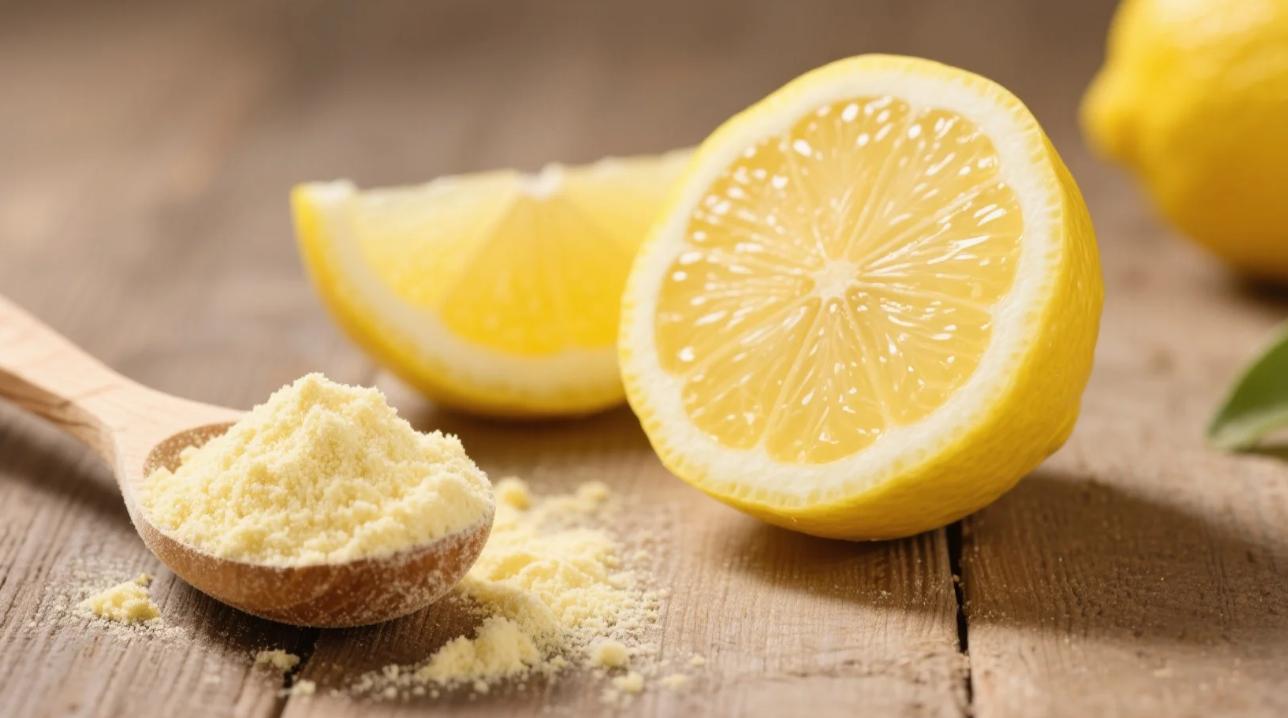Table of Contents
Fresh lemons seem irreplaceable—until you’re squeezing your fifth lemon for a recipe or tossing moldy ones. Organic lemon powder and juice powder promise convenience without compromise, but do they truly match whole fruit nutrition? Science reveals a nuanced answer: Yes, if processed correctly—and organic certification makes the difference.
Fresh vs. Powdered: Where Each Wins
| Application | Fresh Lemon | Organic Lemon Powder | Organic Juice Powder |
|---|---|---|---|
| Vitamin C Content | High (53mg/fruit) → degrades fast | Stabilized (50mg/tsp)* | Preserved (45mg/tsp)* |
| Limonene Bioactivity | Peel oils (anti-cancer) | Peel powder retains 92% | Lost in juicing |
| Culinary Use | Zest + juice combo | Whole powder = zest substitute | Pure sour punch |
| Enzyme Activity | Active enzymes → tenderize meats | Inactivated by drying | Inactivated |
| Storage | 3 weeks max (risk mold) | 2+ years shelf-stable | 2+ years |
| Oxalates | Low in juice | Peel powder: high (avoid kidney stones) | Low (juice only) |
*When freeze-dried below 42°C
Why Processing Method Defines Quality
Conventional powders lose due to:
- High-heat drying → destroys limonene & vitamin C
- Sulfur dioxide bleaching → triggers asthma
- Concentrated pesticides in peel powder
Organic certification ensures:
✅ Freeze-drying or low-temp spray drying (retains volatiles)
✅ Peel sourced from unpesticided fruit (critical for powders)
✅ No preservatives or anti-caking agents → pure lemon
3 Tests to Spot Inferior Powder
- Water Reaction Test
Mix 1 tsp powder in water:- Authentic organic: clouds briefly → clears (natural oils emulsifying)
- Low-quality: chalky residue (fillers like maltodextrin)
- UV Light Check
Spread powder thin → expose to sunlight 1h:- True organic: bright yellow unchanged (antioxidants protect)
- Degraded: fades to beige (oxidized compounds)
- Acidity Verification
Add to baking soda:- Vigorous fizz → citric acid intact
- Weak reaction → heat-damaged
When Fresh Still Reigns Supreme
✅ Raw applications: Ceviche, fresh dressings (enzymes matter)
✅ Peel-dependent recipes: Limoncello (oil extraction needs zest)
✅ High-dose detox: Juicing for liver cleanses
Kitchen Hacks Only Powder Enables
- Bakery Brilliance
Replace zest with organic lemon powder in cookies → no soggy bits, 100% flavor distribution. - Instant Electrolyte Boost
Mix 1 tsp juice powder + water + salt → hydrates faster than fresh juice (rapid pH correction). - Cream Sauce Stabilizer
Whisk 1/2 tsp peel powder into béchamel → prevents curdling without flour. - Emergency Mold Rescue
Dust berries with peel powder → inhibits fungal growth 3x longer than vinegar wash.
The Nutrient Trade-Offs: Honest Math
Fresh lemon delivers:
- Active enzymes
- Unbeatable aroma experience
Organic powders provide:
→ Year-round consistency (no seasonal flavor changes)
→ 30% more bioflavonoids per gram (concentrated peel)
→ 10x longer shelf life
→ No waste (100% fruit utilized)
The Bottom Line
Organic lemon powder isn’t a downgrade—it’s a preservation triumph. For cooking, baking, and daily nutrients, it matches—and often exceeds—fresh lemon benefits. Organic juice powder shines in drinks and acidic recipes where peel bitterness is unwanted. Choose freeze-dried organic options, and you’ll taste the difference: sunshine preserved in a jar.
Last Squeeze? Stir 1 tsp organic peel powder into yogurt. The absence of chewable bits reveals what fresh can’t: flavor without compromise—anywhere, anytime.
Related Products
Organic Lemon Powder
Form: Powder Process Method: Freeze Drying, Spray drying, Air Drying
Organic Maltodextrin Powder
A high-purity, non-GMO carrier and bulking agent with excellent solubility. It enhances…
